BMP4002 Business Law: Report on Law Sources for UK Businesses
VerifiedAdded on 2023/06/10
|8
|2479
|104
Report
AI Summary
This report provides an overview of the key sources of law governing businesses in the UK, focusing on the legal context for business organizations. It discusses various types of businesses, including sole proprietorships, partnerships, limited liability partnerships, and limited liability companies, outlining their features, merits, and demerits. The report references the Companies Act 2006, the Insolvency Act 1986, the Equality Act 2010, the Employment Right Act 1996, and the Partnership Act 1890. It also touches on concepts like vicarious liability and negligence, and the duties and potential liabilities of company directors. The report concludes with a recommendation for IOM Solutions to adopt a Limited Liability Company structure for optimal growth and reduced risk, highlighting the benefits of attracting more capital investment. This assignment solution is available on Desklib, a platform offering a wide range of study resources for students.
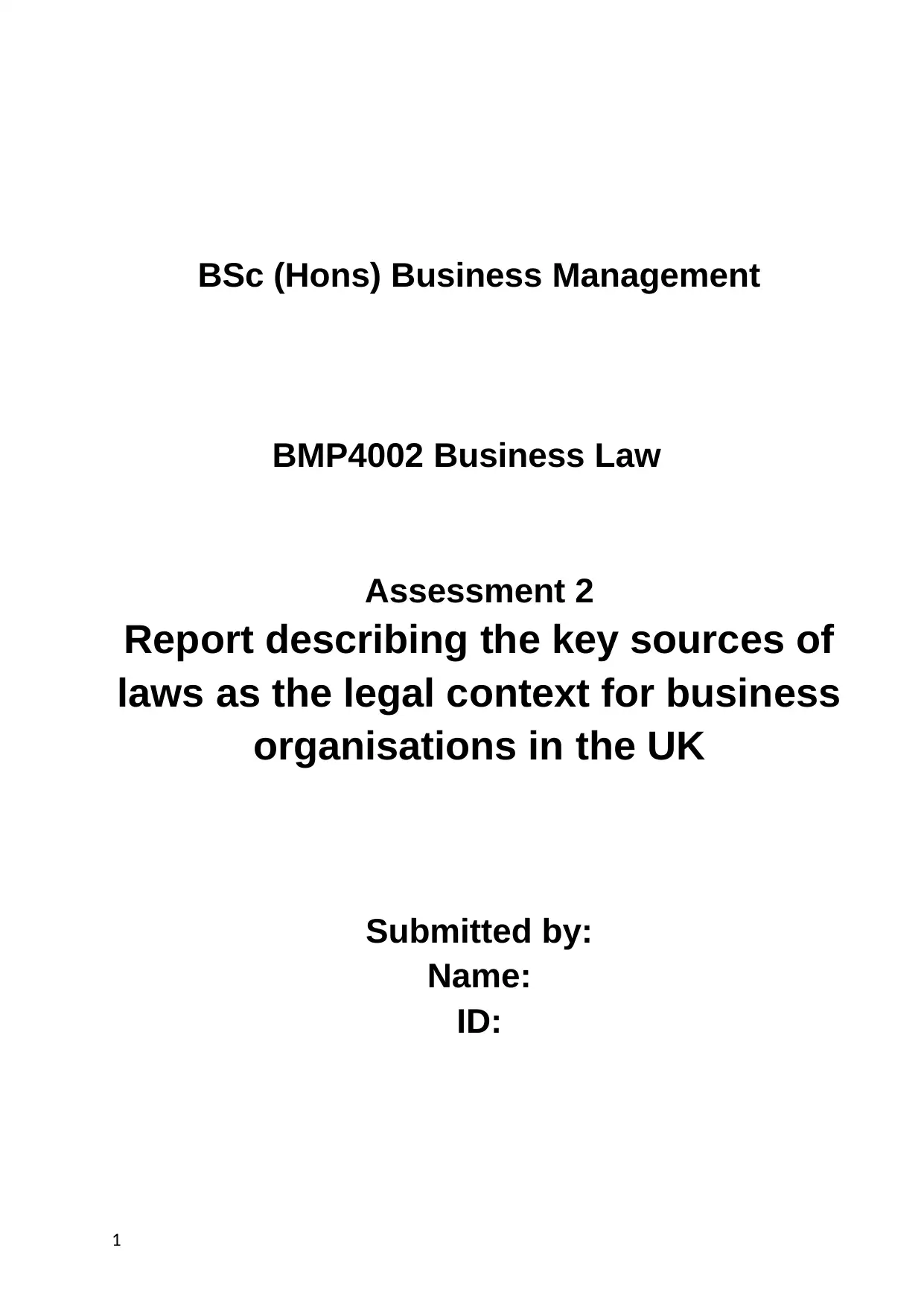
BSc (Hons) Business Management
BMP4002 Business Law
Assessment 2
Report describing the key sources of
laws as the legal context for business
organisations in the UK
Submitted by:
Name:
ID:
1
BMP4002 Business Law
Assessment 2
Report describing the key sources of
laws as the legal context for business
organisations in the UK
Submitted by:
Name:
ID:
1
Paraphrase This Document
Need a fresh take? Get an instant paraphrase of this document with our AI Paraphraser
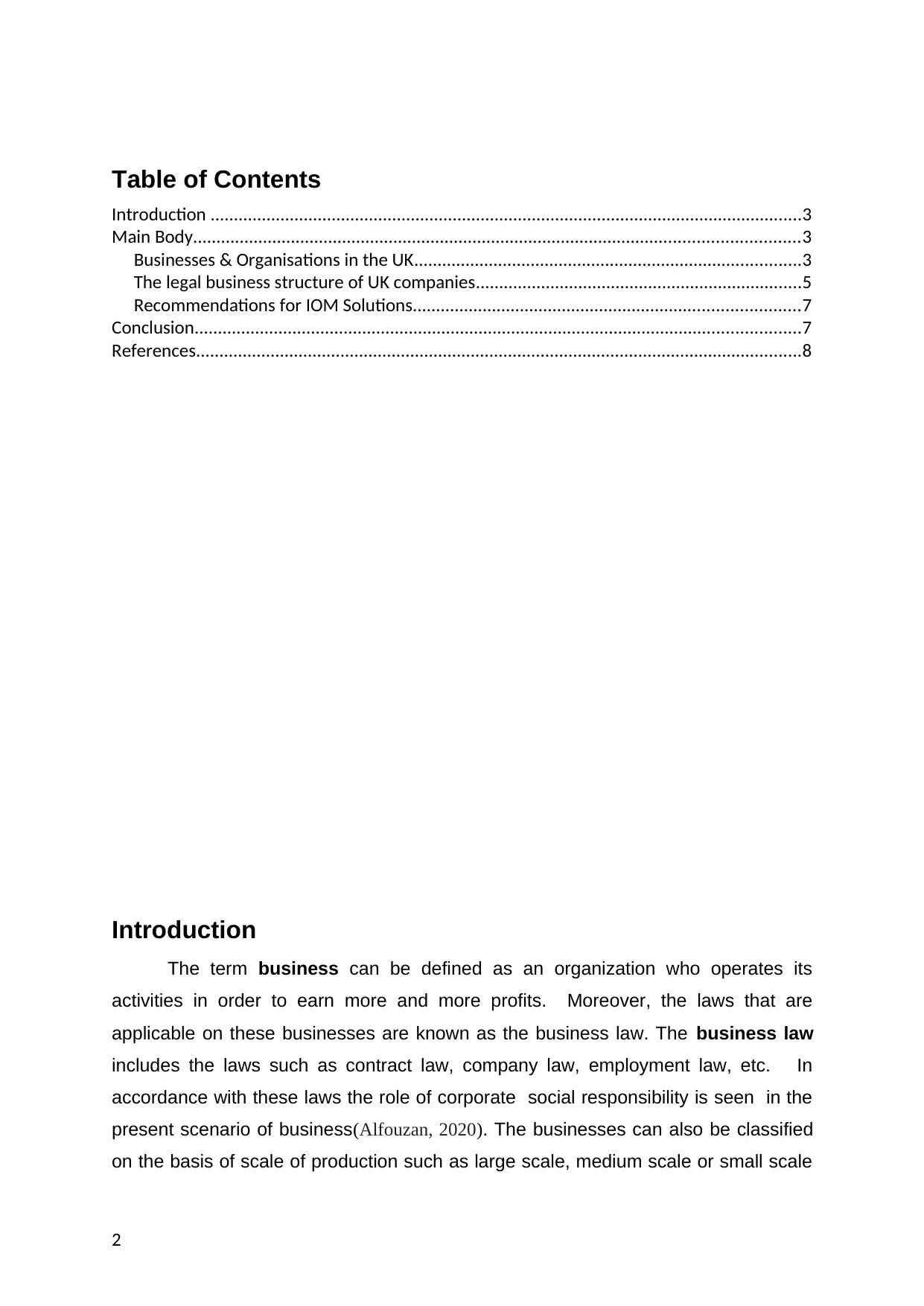
Table of Contents
Introduction ...............................................................................................................................3
Main Body..................................................................................................................................3
Businesses & Organisations in the UK...................................................................................3
The legal business structure of UK companies......................................................................5
Recommendations for IOM Solutions...................................................................................7
Conclusion..................................................................................................................................7
References..................................................................................................................................8
Introduction
The term business can be defined as an organization who operates its
activities in order to earn more and more profits. Moreover, the laws that are
applicable on these businesses are known as the business law. The business law
includes the laws such as contract law, company law, employment law, etc. In
accordance with these laws the role of corporate social responsibility is seen in the
present scenario of business(Alfouzan, 2020). The businesses can also be classified
on the basis of scale of production such as large scale, medium scale or small scale
2
Introduction ...............................................................................................................................3
Main Body..................................................................................................................................3
Businesses & Organisations in the UK...................................................................................3
The legal business structure of UK companies......................................................................5
Recommendations for IOM Solutions...................................................................................7
Conclusion..................................................................................................................................7
References..................................................................................................................................8
Introduction
The term business can be defined as an organization who operates its
activities in order to earn more and more profits. Moreover, the laws that are
applicable on these businesses are known as the business law. The business law
includes the laws such as contract law, company law, employment law, etc. In
accordance with these laws the role of corporate social responsibility is seen in the
present scenario of business(Alfouzan, 2020). The businesses can also be classified
on the basis of scale of production such as large scale, medium scale or small scale
2
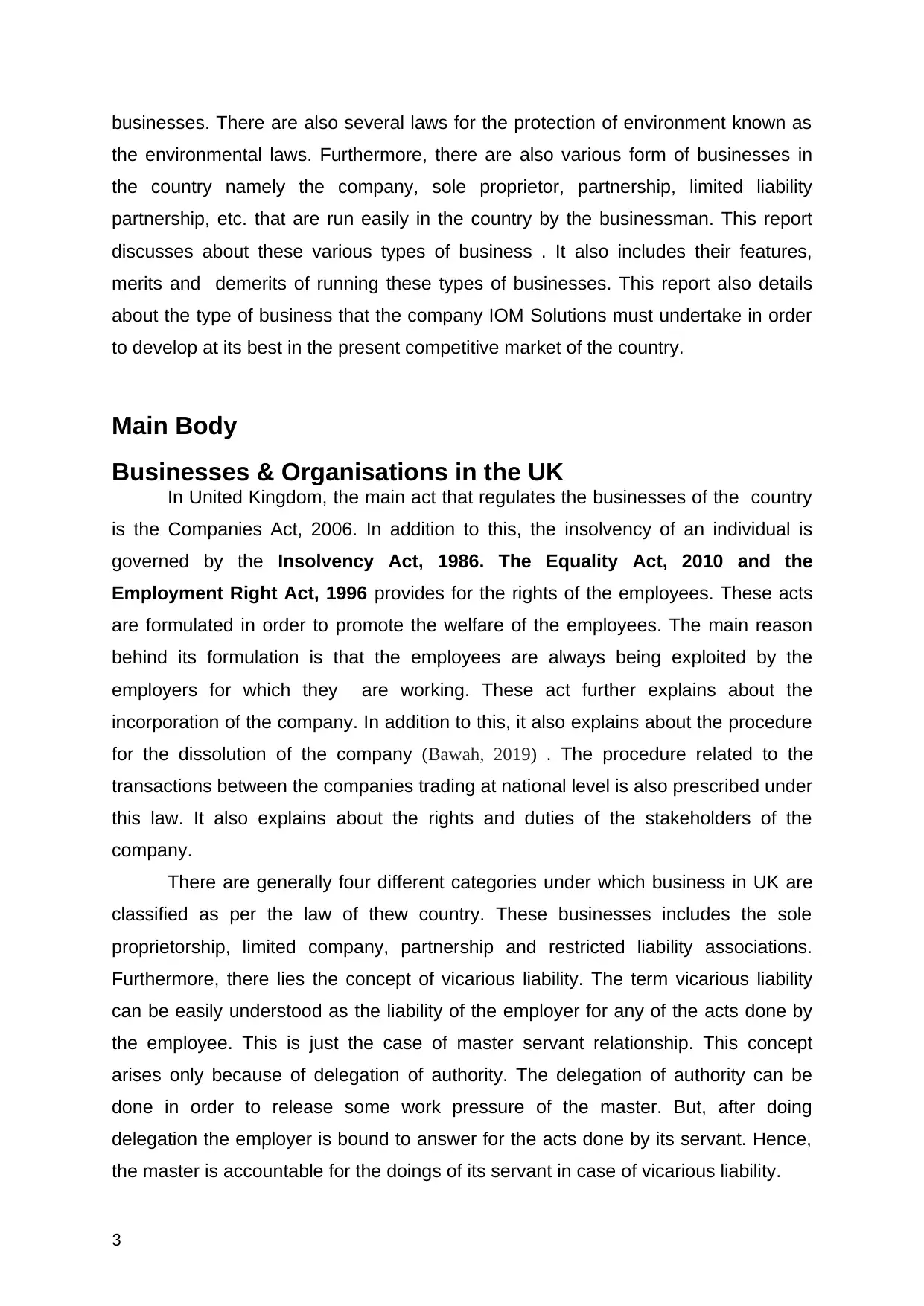
businesses. There are also several laws for the protection of environment known as
the environmental laws. Furthermore, there are also various form of businesses in
the country namely the company, sole proprietor, partnership, limited liability
partnership, etc. that are run easily in the country by the businessman. This report
discusses about these various types of business . It also includes their features,
merits and demerits of running these types of businesses. This report also details
about the type of business that the company IOM Solutions must undertake in order
to develop at its best in the present competitive market of the country.
Main Body
Businesses & Organisations in the UK
In United Kingdom, the main act that regulates the businesses of the country
is the Companies Act, 2006. In addition to this, the insolvency of an individual is
governed by the Insolvency Act, 1986. The Equality Act, 2010 and the
Employment Right Act, 1996 provides for the rights of the employees. These acts
are formulated in order to promote the welfare of the employees. The main reason
behind its formulation is that the employees are always being exploited by the
employers for which they are working. These act further explains about the
incorporation of the company. In addition to this, it also explains about the procedure
for the dissolution of the company (Bawah, 2019) . The procedure related to the
transactions between the companies trading at national level is also prescribed under
this law. It also explains about the rights and duties of the stakeholders of the
company.
There are generally four different categories under which business in UK are
classified as per the law of thew country. These businesses includes the sole
proprietorship, limited company, partnership and restricted liability associations.
Furthermore, there lies the concept of vicarious liability. The term vicarious liability
can be easily understood as the liability of the employer for any of the acts done by
the employee. This is just the case of master servant relationship. This concept
arises only because of delegation of authority. The delegation of authority can be
done in order to release some work pressure of the master. But, after doing
delegation the employer is bound to answer for the acts done by its servant. Hence,
the master is accountable for the doings of its servant in case of vicarious liability.
3
the environmental laws. Furthermore, there are also various form of businesses in
the country namely the company, sole proprietor, partnership, limited liability
partnership, etc. that are run easily in the country by the businessman. This report
discusses about these various types of business . It also includes their features,
merits and demerits of running these types of businesses. This report also details
about the type of business that the company IOM Solutions must undertake in order
to develop at its best in the present competitive market of the country.
Main Body
Businesses & Organisations in the UK
In United Kingdom, the main act that regulates the businesses of the country
is the Companies Act, 2006. In addition to this, the insolvency of an individual is
governed by the Insolvency Act, 1986. The Equality Act, 2010 and the
Employment Right Act, 1996 provides for the rights of the employees. These acts
are formulated in order to promote the welfare of the employees. The main reason
behind its formulation is that the employees are always being exploited by the
employers for which they are working. These act further explains about the
incorporation of the company. In addition to this, it also explains about the procedure
for the dissolution of the company (Bawah, 2019) . The procedure related to the
transactions between the companies trading at national level is also prescribed under
this law. It also explains about the rights and duties of the stakeholders of the
company.
There are generally four different categories under which business in UK are
classified as per the law of thew country. These businesses includes the sole
proprietorship, limited company, partnership and restricted liability associations.
Furthermore, there lies the concept of vicarious liability. The term vicarious liability
can be easily understood as the liability of the employer for any of the acts done by
the employee. This is just the case of master servant relationship. This concept
arises only because of delegation of authority. The delegation of authority can be
done in order to release some work pressure of the master. But, after doing
delegation the employer is bound to answer for the acts done by its servant. Hence,
the master is accountable for the doings of its servant in case of vicarious liability.
3
⊘ This is a preview!⊘
Do you want full access?
Subscribe today to unlock all pages.

Trusted by 1+ million students worldwide
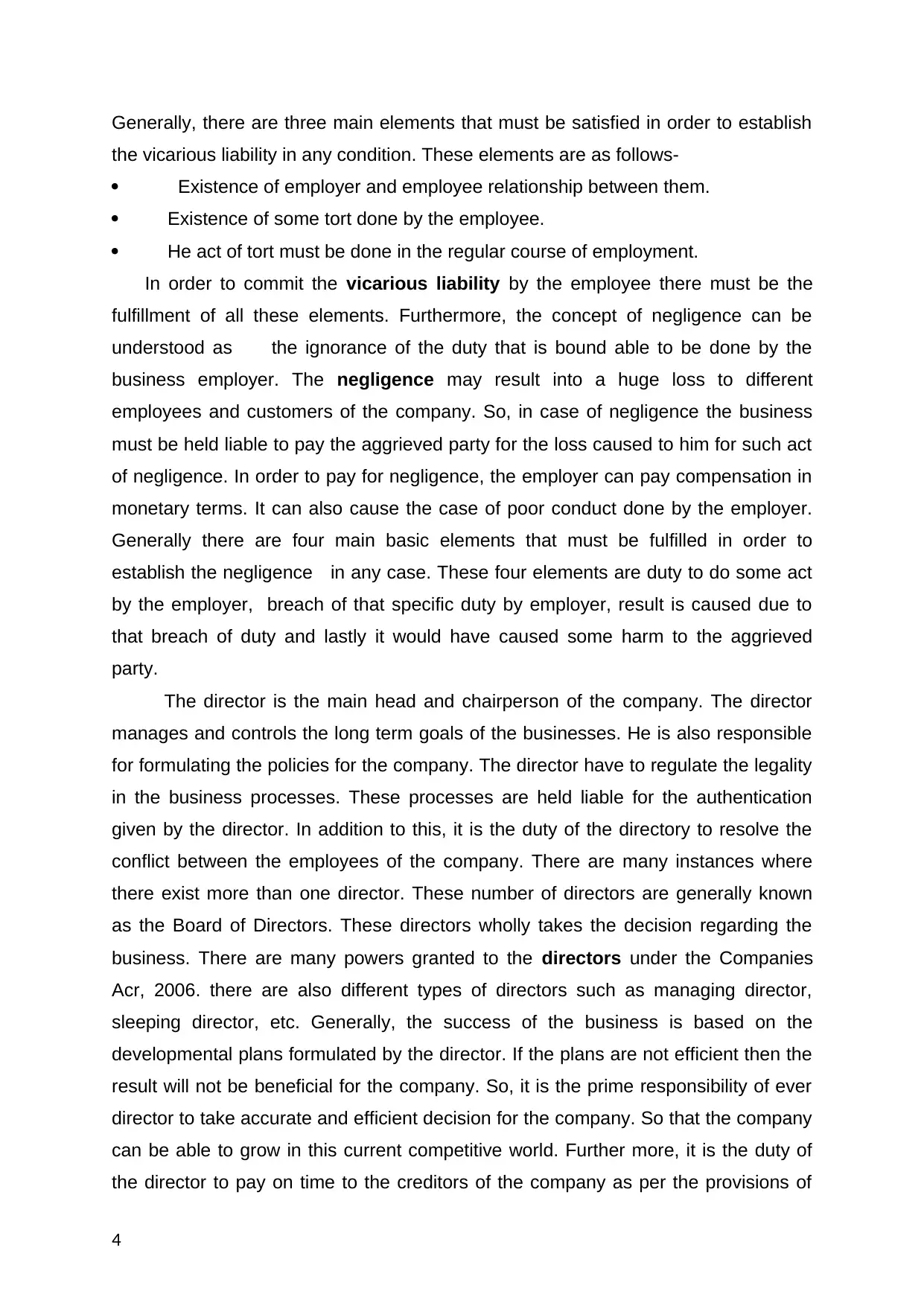
Generally, there are three main elements that must be satisfied in order to establish
the vicarious liability in any condition. These elements are as follows-
Existence of employer and employee relationship between them.
Existence of some tort done by the employee.
He act of tort must be done in the regular course of employment.
In order to commit the vicarious liability by the employee there must be the
fulfillment of all these elements. Furthermore, the concept of negligence can be
understood as the ignorance of the duty that is bound able to be done by the
business employer. The negligence may result into a huge loss to different
employees and customers of the company. So, in case of negligence the business
must be held liable to pay the aggrieved party for the loss caused to him for such act
of negligence. In order to pay for negligence, the employer can pay compensation in
monetary terms. It can also cause the case of poor conduct done by the employer.
Generally there are four main basic elements that must be fulfilled in order to
establish the negligence in any case. These four elements are duty to do some act
by the employer, breach of that specific duty by employer, result is caused due to
that breach of duty and lastly it would have caused some harm to the aggrieved
party.
The director is the main head and chairperson of the company. The director
manages and controls the long term goals of the businesses. He is also responsible
for formulating the policies for the company. The director have to regulate the legality
in the business processes. These processes are held liable for the authentication
given by the director. In addition to this, it is the duty of the directory to resolve the
conflict between the employees of the company. There are many instances where
there exist more than one director. These number of directors are generally known
as the Board of Directors. These directors wholly takes the decision regarding the
business. There are many powers granted to the directors under the Companies
Acr, 2006. there are also different types of directors such as managing director,
sleeping director, etc. Generally, the success of the business is based on the
developmental plans formulated by the director. If the plans are not efficient then the
result will not be beneficial for the company. So, it is the prime responsibility of ever
director to take accurate and efficient decision for the company. So that the company
can be able to grow in this current competitive world. Further more, it is the duty of
the director to pay on time to the creditors of the company as per the provisions of
4
the vicarious liability in any condition. These elements are as follows-
Existence of employer and employee relationship between them.
Existence of some tort done by the employee.
He act of tort must be done in the regular course of employment.
In order to commit the vicarious liability by the employee there must be the
fulfillment of all these elements. Furthermore, the concept of negligence can be
understood as the ignorance of the duty that is bound able to be done by the
business employer. The negligence may result into a huge loss to different
employees and customers of the company. So, in case of negligence the business
must be held liable to pay the aggrieved party for the loss caused to him for such act
of negligence. In order to pay for negligence, the employer can pay compensation in
monetary terms. It can also cause the case of poor conduct done by the employer.
Generally there are four main basic elements that must be fulfilled in order to
establish the negligence in any case. These four elements are duty to do some act
by the employer, breach of that specific duty by employer, result is caused due to
that breach of duty and lastly it would have caused some harm to the aggrieved
party.
The director is the main head and chairperson of the company. The director
manages and controls the long term goals of the businesses. He is also responsible
for formulating the policies for the company. The director have to regulate the legality
in the business processes. These processes are held liable for the authentication
given by the director. In addition to this, it is the duty of the directory to resolve the
conflict between the employees of the company. There are many instances where
there exist more than one director. These number of directors are generally known
as the Board of Directors. These directors wholly takes the decision regarding the
business. There are many powers granted to the directors under the Companies
Acr, 2006. there are also different types of directors such as managing director,
sleeping director, etc. Generally, the success of the business is based on the
developmental plans formulated by the director. If the plans are not efficient then the
result will not be beneficial for the company. So, it is the prime responsibility of ever
director to take accurate and efficient decision for the company. So that the company
can be able to grow in this current competitive world. Further more, it is the duty of
the director to pay on time to the creditors of the company as per the provisions of
4
Paraphrase This Document
Need a fresh take? Get an instant paraphrase of this document with our AI Paraphraser
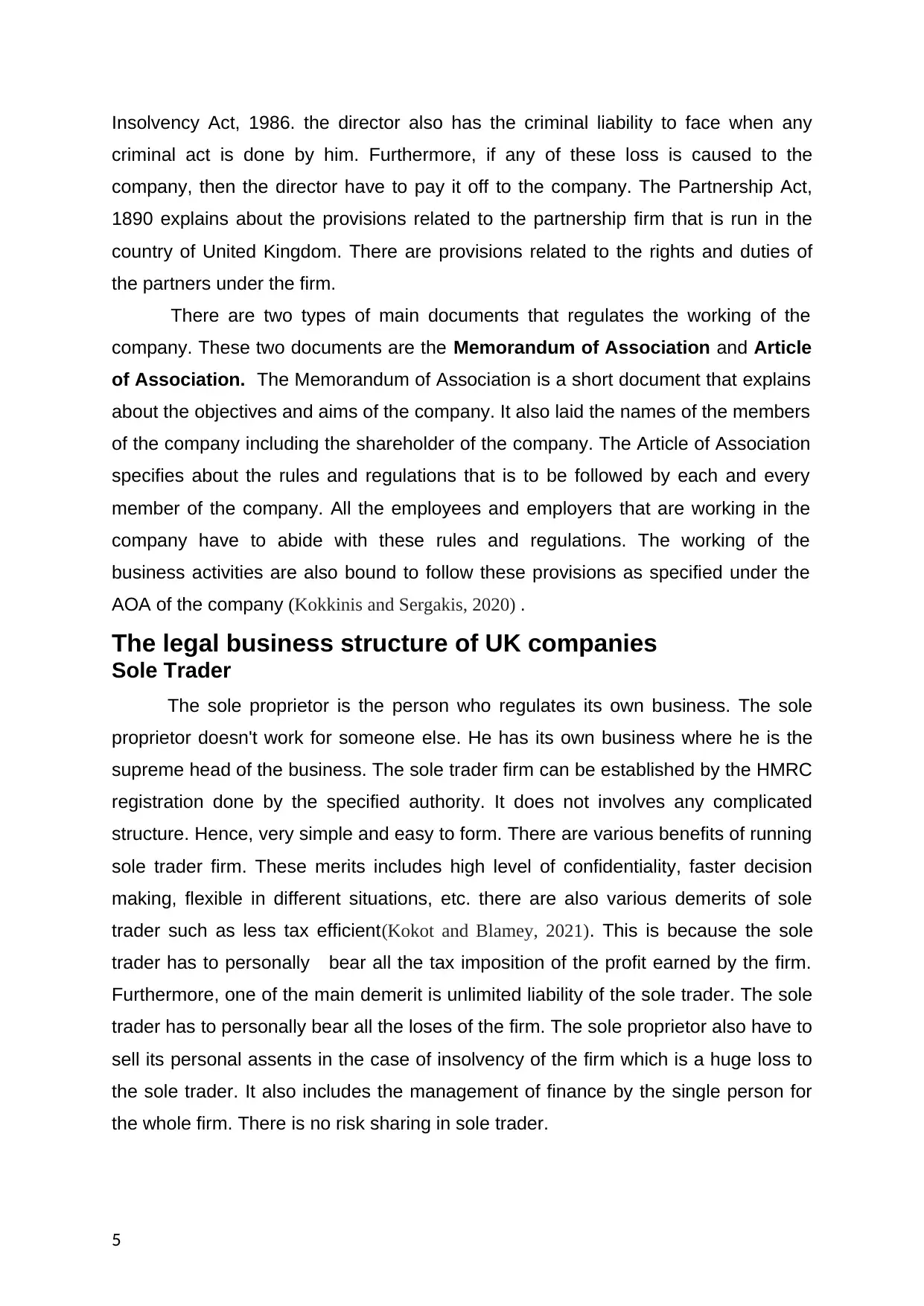
Insolvency Act, 1986. the director also has the criminal liability to face when any
criminal act is done by him. Furthermore, if any of these loss is caused to the
company, then the director have to pay it off to the company. The Partnership Act,
1890 explains about the provisions related to the partnership firm that is run in the
country of United Kingdom. There are provisions related to the rights and duties of
the partners under the firm.
There are two types of main documents that regulates the working of the
company. These two documents are the Memorandum of Association and Article
of Association. The Memorandum of Association is a short document that explains
about the objectives and aims of the company. It also laid the names of the members
of the company including the shareholder of the company. The Article of Association
specifies about the rules and regulations that is to be followed by each and every
member of the company. All the employees and employers that are working in the
company have to abide with these rules and regulations. The working of the
business activities are also bound to follow these provisions as specified under the
AOA of the company (Kokkinis and Sergakis, 2020) .
The legal business structure of UK companies
Sole Trader
The sole proprietor is the person who regulates its own business. The sole
proprietor doesn't work for someone else. He has its own business where he is the
supreme head of the business. The sole trader firm can be established by the HMRC
registration done by the specified authority. It does not involves any complicated
structure. Hence, very simple and easy to form. There are various benefits of running
sole trader firm. These merits includes high level of confidentiality, faster decision
making, flexible in different situations, etc. there are also various demerits of sole
trader such as less tax efficient(Kokot and Blamey, 2021). This is because the sole
trader has to personally bear all the tax imposition of the profit earned by the firm.
Furthermore, one of the main demerit is unlimited liability of the sole trader. The sole
trader has to personally bear all the loses of the firm. The sole proprietor also have to
sell its personal assents in the case of insolvency of the firm which is a huge loss to
the sole trader. It also includes the management of finance by the single person for
the whole firm. There is no risk sharing in sole trader.
5
criminal act is done by him. Furthermore, if any of these loss is caused to the
company, then the director have to pay it off to the company. The Partnership Act,
1890 explains about the provisions related to the partnership firm that is run in the
country of United Kingdom. There are provisions related to the rights and duties of
the partners under the firm.
There are two types of main documents that regulates the working of the
company. These two documents are the Memorandum of Association and Article
of Association. The Memorandum of Association is a short document that explains
about the objectives and aims of the company. It also laid the names of the members
of the company including the shareholder of the company. The Article of Association
specifies about the rules and regulations that is to be followed by each and every
member of the company. All the employees and employers that are working in the
company have to abide with these rules and regulations. The working of the
business activities are also bound to follow these provisions as specified under the
AOA of the company (Kokkinis and Sergakis, 2020) .
The legal business structure of UK companies
Sole Trader
The sole proprietor is the person who regulates its own business. The sole
proprietor doesn't work for someone else. He has its own business where he is the
supreme head of the business. The sole trader firm can be established by the HMRC
registration done by the specified authority. It does not involves any complicated
structure. Hence, very simple and easy to form. There are various benefits of running
sole trader firm. These merits includes high level of confidentiality, faster decision
making, flexible in different situations, etc. there are also various demerits of sole
trader such as less tax efficient(Kokot and Blamey, 2021). This is because the sole
trader has to personally bear all the tax imposition of the profit earned by the firm.
Furthermore, one of the main demerit is unlimited liability of the sole trader. The sole
trader has to personally bear all the loses of the firm. The sole proprietor also have to
sell its personal assents in the case of insolvency of the firm which is a huge loss to
the sole trader. It also includes the management of finance by the single person for
the whole firm. There is no risk sharing in sole trader.
5
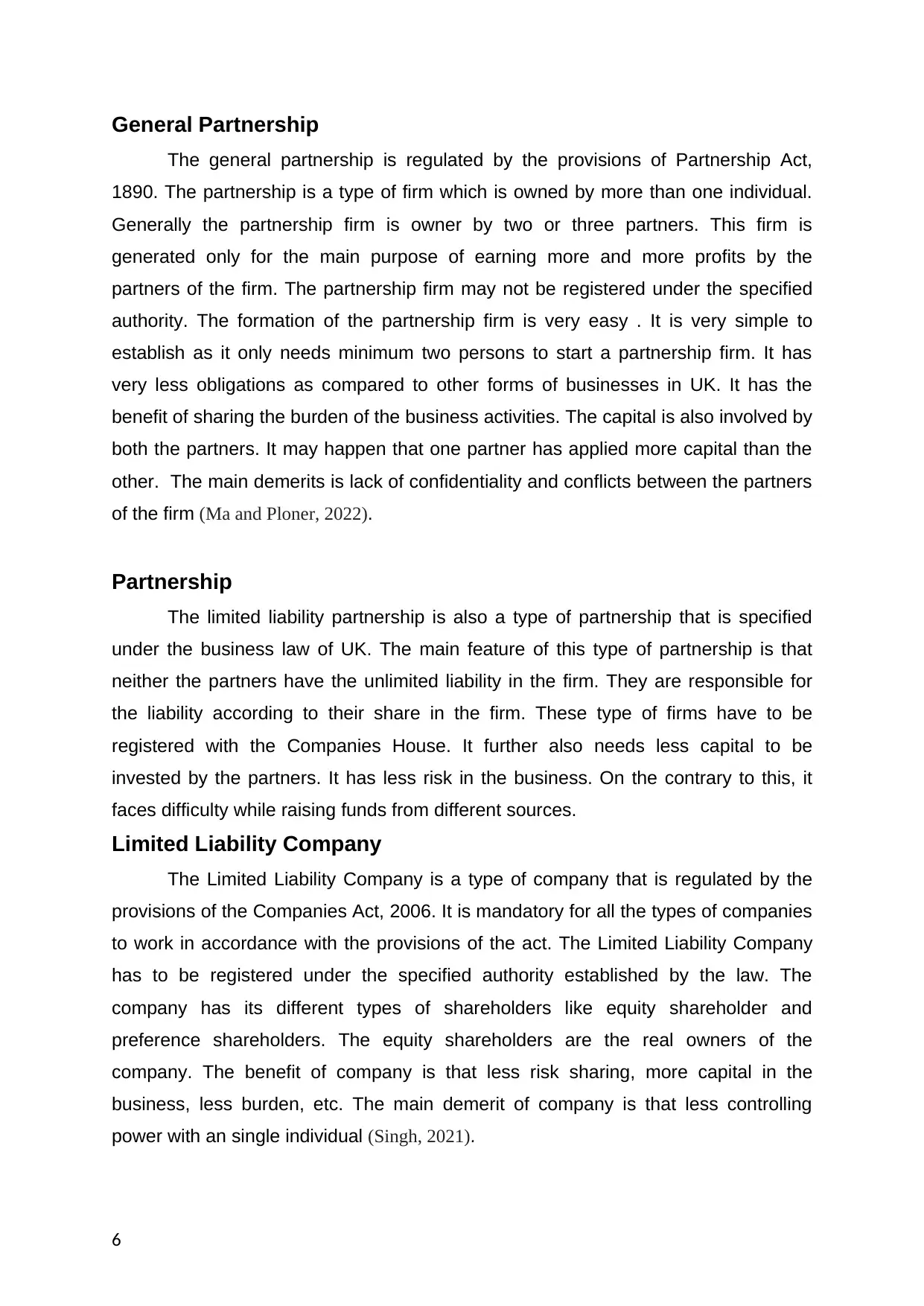
General Partnership
The general partnership is regulated by the provisions of Partnership Act,
1890. The partnership is a type of firm which is owned by more than one individual.
Generally the partnership firm is owner by two or three partners. This firm is
generated only for the main purpose of earning more and more profits by the
partners of the firm. The partnership firm may not be registered under the specified
authority. The formation of the partnership firm is very easy . It is very simple to
establish as it only needs minimum two persons to start a partnership firm. It has
very less obligations as compared to other forms of businesses in UK. It has the
benefit of sharing the burden of the business activities. The capital is also involved by
both the partners. It may happen that one partner has applied more capital than the
other. The main demerits is lack of confidentiality and conflicts between the partners
of the firm (Ma and Ploner, 2022).
Partnership
The limited liability partnership is also a type of partnership that is specified
under the business law of UK. The main feature of this type of partnership is that
neither the partners have the unlimited liability in the firm. They are responsible for
the liability according to their share in the firm. These type of firms have to be
registered with the Companies House. It further also needs less capital to be
invested by the partners. It has less risk in the business. On the contrary to this, it
faces difficulty while raising funds from different sources.
Limited Liability Company
The Limited Liability Company is a type of company that is regulated by the
provisions of the Companies Act, 2006. It is mandatory for all the types of companies
to work in accordance with the provisions of the act. The Limited Liability Company
has to be registered under the specified authority established by the law. The
company has its different types of shareholders like equity shareholder and
preference shareholders. The equity shareholders are the real owners of the
company. The benefit of company is that less risk sharing, more capital in the
business, less burden, etc. The main demerit of company is that less controlling
power with an single individual (Singh, 2021).
6
The general partnership is regulated by the provisions of Partnership Act,
1890. The partnership is a type of firm which is owned by more than one individual.
Generally the partnership firm is owner by two or three partners. This firm is
generated only for the main purpose of earning more and more profits by the
partners of the firm. The partnership firm may not be registered under the specified
authority. The formation of the partnership firm is very easy . It is very simple to
establish as it only needs minimum two persons to start a partnership firm. It has
very less obligations as compared to other forms of businesses in UK. It has the
benefit of sharing the burden of the business activities. The capital is also involved by
both the partners. It may happen that one partner has applied more capital than the
other. The main demerits is lack of confidentiality and conflicts between the partners
of the firm (Ma and Ploner, 2022).
Partnership
The limited liability partnership is also a type of partnership that is specified
under the business law of UK. The main feature of this type of partnership is that
neither the partners have the unlimited liability in the firm. They are responsible for
the liability according to their share in the firm. These type of firms have to be
registered with the Companies House. It further also needs less capital to be
invested by the partners. It has less risk in the business. On the contrary to this, it
faces difficulty while raising funds from different sources.
Limited Liability Company
The Limited Liability Company is a type of company that is regulated by the
provisions of the Companies Act, 2006. It is mandatory for all the types of companies
to work in accordance with the provisions of the act. The Limited Liability Company
has to be registered under the specified authority established by the law. The
company has its different types of shareholders like equity shareholder and
preference shareholders. The equity shareholders are the real owners of the
company. The benefit of company is that less risk sharing, more capital in the
business, less burden, etc. The main demerit of company is that less controlling
power with an single individual (Singh, 2021).
6
⊘ This is a preview!⊘
Do you want full access?
Subscribe today to unlock all pages.

Trusted by 1+ million students worldwide
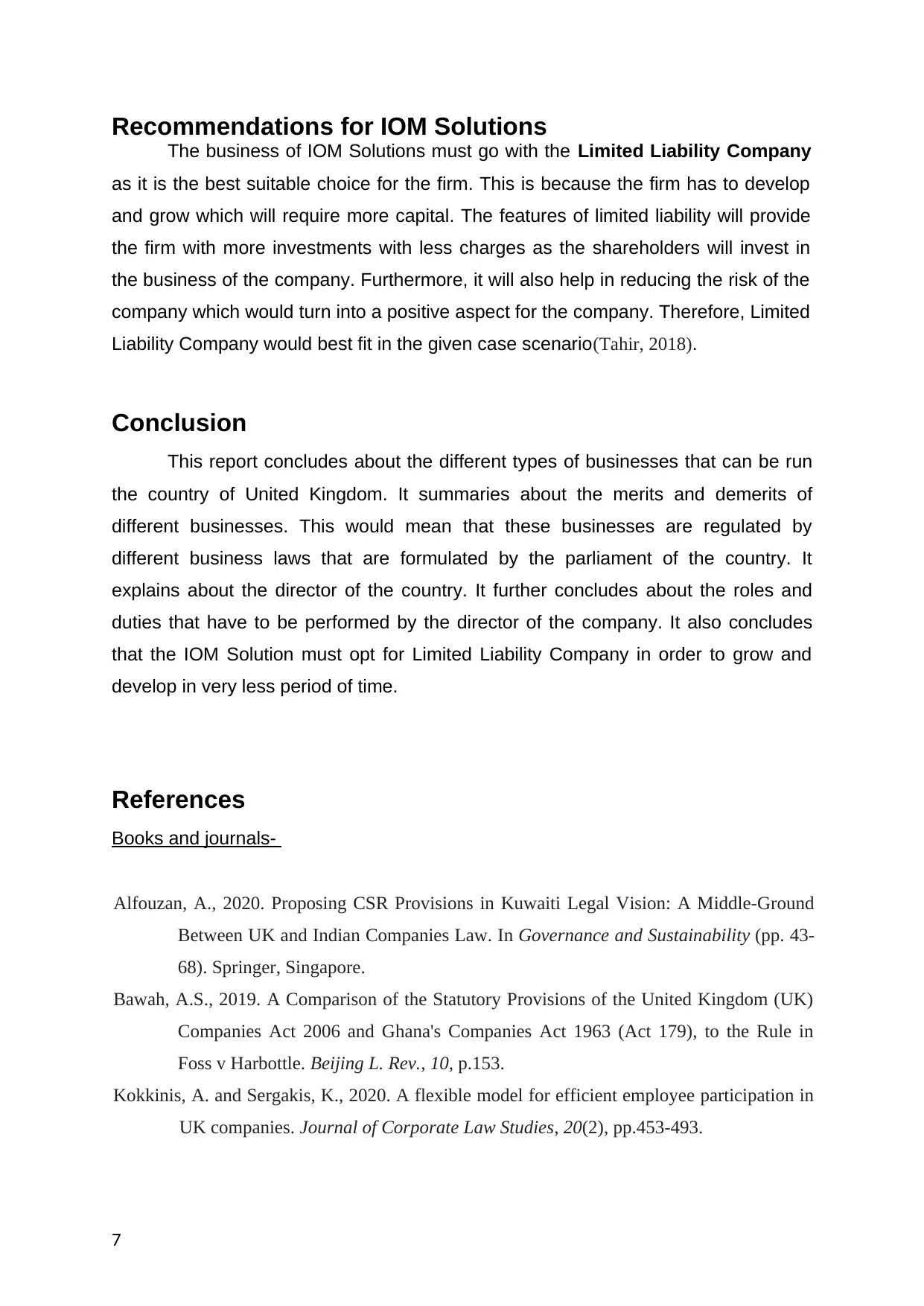
Recommendations for IOM Solutions
The business of IOM Solutions must go with the Limited Liability Company
as it is the best suitable choice for the firm. This is because the firm has to develop
and grow which will require more capital. The features of limited liability will provide
the firm with more investments with less charges as the shareholders will invest in
the business of the company. Furthermore, it will also help in reducing the risk of the
company which would turn into a positive aspect for the company. Therefore, Limited
Liability Company would best fit in the given case scenario(Tahir, 2018).
Conclusion
This report concludes about the different types of businesses that can be run
the country of United Kingdom. It summaries about the merits and demerits of
different businesses. This would mean that these businesses are regulated by
different business laws that are formulated by the parliament of the country. It
explains about the director of the country. It further concludes about the roles and
duties that have to be performed by the director of the company. It also concludes
that the IOM Solution must opt for Limited Liability Company in order to grow and
develop in very less period of time.
References
Books and journals-
Alfouzan, A., 2020. Proposing CSR Provisions in Kuwaiti Legal Vision: A Middle-Ground
Between UK and Indian Companies Law. In Governance and Sustainability (pp. 43-
68). Springer, Singapore.
Bawah, A.S., 2019. A Comparison of the Statutory Provisions of the United Kingdom (UK)
Companies Act 2006 and Ghana's Companies Act 1963 (Act 179), to the Rule in
Foss v Harbottle. Beijing L. Rev., 10, p.153.
Kokkinis, A. and Sergakis, K., 2020. A flexible model for efficient employee participation in
UK companies. Journal of Corporate Law Studies, 20(2), pp.453-493.
7
The business of IOM Solutions must go with the Limited Liability Company
as it is the best suitable choice for the firm. This is because the firm has to develop
and grow which will require more capital. The features of limited liability will provide
the firm with more investments with less charges as the shareholders will invest in
the business of the company. Furthermore, it will also help in reducing the risk of the
company which would turn into a positive aspect for the company. Therefore, Limited
Liability Company would best fit in the given case scenario(Tahir, 2018).
Conclusion
This report concludes about the different types of businesses that can be run
the country of United Kingdom. It summaries about the merits and demerits of
different businesses. This would mean that these businesses are regulated by
different business laws that are formulated by the parliament of the country. It
explains about the director of the country. It further concludes about the roles and
duties that have to be performed by the director of the company. It also concludes
that the IOM Solution must opt for Limited Liability Company in order to grow and
develop in very less period of time.
References
Books and journals-
Alfouzan, A., 2020. Proposing CSR Provisions in Kuwaiti Legal Vision: A Middle-Ground
Between UK and Indian Companies Law. In Governance and Sustainability (pp. 43-
68). Springer, Singapore.
Bawah, A.S., 2019. A Comparison of the Statutory Provisions of the United Kingdom (UK)
Companies Act 2006 and Ghana's Companies Act 1963 (Act 179), to the Rule in
Foss v Harbottle. Beijing L. Rev., 10, p.153.
Kokkinis, A. and Sergakis, K., 2020. A flexible model for efficient employee participation in
UK companies. Journal of Corporate Law Studies, 20(2), pp.453-493.
7
Paraphrase This Document
Need a fresh take? Get an instant paraphrase of this document with our AI Paraphraser
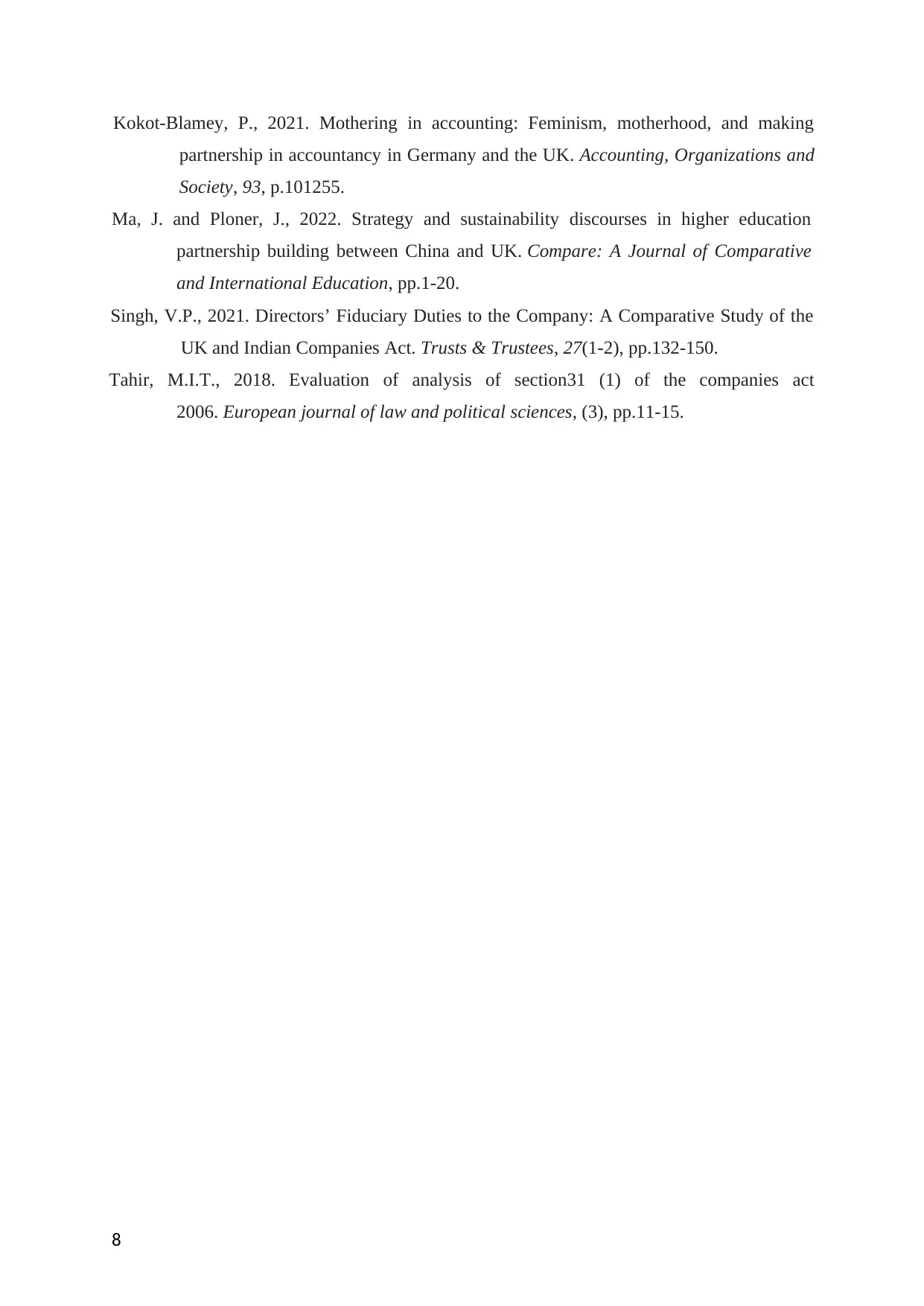
Kokot-Blamey, P., 2021. Mothering in accounting: Feminism, motherhood, and making
partnership in accountancy in Germany and the UK. Accounting, Organizations and
Society, 93, p.101255.
Ma, J. and Ploner, J., 2022. Strategy and sustainability discourses in higher education
partnership building between China and UK. Compare: A Journal of Comparative
and International Education, pp.1-20.
Singh, V.P., 2021. Directors’ Fiduciary Duties to the Company: A Comparative Study of the
UK and Indian Companies Act. Trusts & Trustees, 27(1-2), pp.132-150.
Tahir, M.I.T., 2018. Evaluation of analysis of section31 (1) of the companies act
2006. European journal of law and political sciences, (3), pp.11-15.
8
partnership in accountancy in Germany and the UK. Accounting, Organizations and
Society, 93, p.101255.
Ma, J. and Ploner, J., 2022. Strategy and sustainability discourses in higher education
partnership building between China and UK. Compare: A Journal of Comparative
and International Education, pp.1-20.
Singh, V.P., 2021. Directors’ Fiduciary Duties to the Company: A Comparative Study of the
UK and Indian Companies Act. Trusts & Trustees, 27(1-2), pp.132-150.
Tahir, M.I.T., 2018. Evaluation of analysis of section31 (1) of the companies act
2006. European journal of law and political sciences, (3), pp.11-15.
8
1 out of 8
Related Documents
Your All-in-One AI-Powered Toolkit for Academic Success.
+13062052269
info@desklib.com
Available 24*7 on WhatsApp / Email
![[object Object]](/_next/static/media/star-bottom.7253800d.svg)
Unlock your academic potential
Copyright © 2020–2026 A2Z Services. All Rights Reserved. Developed and managed by ZUCOL.


